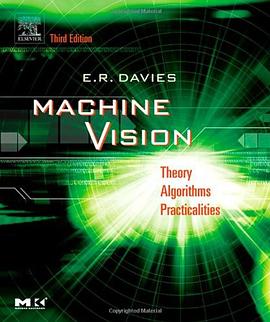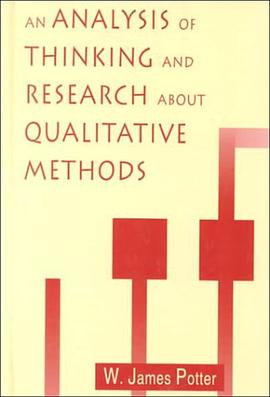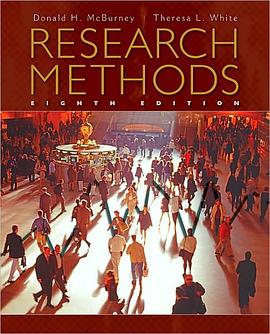

具体描述
"What sets this book apart is its skillful integration of both the scientific and artistic dimensions of qualitative research."</P><DIR> <DIR> <DIR> <DIR>
--From the foreword by Michael Quinn Patton, author of Qualitative Research and Evaluation Methods, 3<SUP>rd</SUP> Edition</P></DIR> </DIR> </DIR> </DIR>
"This is one of the best books I've found for introductory or intermediate qualitative research courses. I have taught this course using this text and the students really raved about it. In particular, the way the text handles issues of data collection, the role of qualitative research, and data analysis are extremely well done. I highly recommend this text as one of the most accessible yet sophisticated books on qualitative research that I've been able to use in my courses. This is an excellent resource that all new qualitative researchers should have on their bookshelf."</P><DIR> <DIR> <DIR> <DIR>
--Alison A. Carr-Chellman, Instructional Systems, Penn State University</P></DIR> </DIR> </DIR> </DIR>
"This is a clearly written and straightforward introduction to qualitative research. The central themes of the book--that qualitative research is learning and qualitative researchers are learners--move the text beyond the 'how to do it' in ways that can be helpful for 'seasoned' qualitative researchers as well as beginners. Thinking about qualitative research as a process of learning--about social phenomena, about participants, about oneself--is a very powerful pedagogical and methodological approach."</P><DIR> <DIR> <DIR> <DIR> <DIR> <DIR>
--Elizabeth J. Whitt, College of Education, University of Iowa</P></DIR> </DIR> </DIR> </DIR> </DIR> </DIR>
The popular text that helped readers better understand and practice qualitative research has been completely updated and revised while retaining the features that made the first edition so useful.</P>
New to this edition:</P> <UL> <LI>Chapter 3 on the ethics and politics of qualitative research </LI> <LI>Chapter 4 on choosing the locus of interest among the major qualitative research approaches </LI> <LI>Chapter 10 expanded to provide detailed instructions for organizing, coding, interpreting, and analyzing data</LI></UL>
To help readers better visualize and grasp the concepts, issues, and complexities of qualitative inquiry, the authors introduce each chapter with discussions among three "characters"--students whose research projects demonstrate the challenges and excitement of qualitative research. Woven into the chapters and the characters' stories are three themes that make up the tapestry of qualitative research: First, research is a learning process. Second, research can and should be useful. Finally, a researcher needs to have a clear vision of the audience and purpose of a study. </P>
Also added to this edition:</P> <UL> <LI>Chapters 8 and 11 present examples of the three student characters' data and analysis </LI> <LI>Concept boxes highlight major themes and issues and summarize important principles </LI> <LI>End-of-chapter study questions and activities</LI></UL>
"Through the perspectives of three students learning about qualitative research, Rossman and Rallis provide an introductory overview of the subject in a clear and direct style with some excellent recommendations for planning the study."</P>
--Johnny Saldana, Theatre Department, Arizona State University</P>
作者简介
目录信息
读后感
评分
评分
评分
评分
用户评价
第二段的评价: 坦白讲,我买这本书是抱着一种半信半疑的态度。如今市面上的“实战指南”太多了,很多都是披着经验外衣的空洞口号。但是,这本书在叙事上的那种克制和深入,让我逐渐放下了戒备。它没有使用那种煽动性的语言来夸大某个技巧的万能性,而是以一种近乎冷静的笔触,解剖了知识内化过程中必然经历的挫折与阵痛。我尤其欣赏作者对“失败案例”的坦诚记录。很多学习的书籍总倾向于展示成功的光环,但真正有价值的经验往往藏在那些走不通的路线上。这种对不完美过程的细致描摹,反而让我感到亲切和真实。它让我意识到,真正的成长不是一蹴而就的曲线,而是布满了调整和修正的锯齿状路径。阅读过程中,我仿佛不是在读别人的经验,而是在对照自己过去的摸索,那些曾经模糊不清的领悟,现在似乎被作者用精准的词汇清晰地标注了出来。这是一种非常高效的“间接经验吸收”。
评分第一段的评价: 这本书的书名其实挺有意思的,初次看到《Learning in the Field》的时候,我立刻联想到了那些深入一线、在实践中摸爬滚打的学习经历。我期待它能像一本实战手册,充满鲜活的案例和真知灼见,而不是枯燥的理论堆砌。翻开扉页,文字的排版就给人一种朴实可靠的感觉,没有太多花哨的设计,让人感觉作者是想把重点放在内容本身。我特别关注那些描述“现场感”的章节,比如作者是如何在复杂的环境中识别问题、如何与形形色色的人打交道,以及最终如何将那些抽象的知识转化为实际的行动力。这种“在场学习”的精髓,对我来说远比课堂上的学习更有价值。我希望能从中找到一些能够立刻应用到我目前工作中的方法论,特别是关于如何应对突发状况和快速适应新环境的技巧。总的来说,这本书给我的第一印象是沉稳、务实,带着一股泥土的芬芳,让人对未来的探索充满信心。我希望它能成为我工具箱里最耐用的一件工具。
评分第四段的评价: 我必须得说,这本书在理论框架的构建上显得尤为扎实。虽然它强调“实地操作”,但它并没有抛弃深厚的学术根基。作者总能在关键时刻,引用一些我不太熟悉的跨学科概念——可能是社会学、认知心理学,甚至是系统论——来支撑自己的观察结论。这种深厚的学术底蕴让整本书的论述跳出了个人经验的局限性,提升到了一个更具普适性的高度。我常常需要停下来,去查阅一下作者提到的某个术语的背景,但这并不是负担,而是一种知识的扩展。它证明了,最有效的实践经验,一定是与最严谨的理论模型相结合的产物。这本书的价值在于,它教会我如何构建一个属于自己的、可以不断迭代和完善的“元认知框架”,而不是仅仅模仿别人的具体操作步骤。这才是真正意义上的能力迁移。
评分第五段的评价: 这本书的语言风格充满了独特的节奏感和韵律,读起来令人身心愉悦,完全没有一般技术性书籍的沉闷感。作者的用词非常考究,擅长使用一些富有画面感的动词和形容词,使得那些抽象的学习过程仿佛被具象化了。例如,描述“思维定势松动”的那个比喻,我至今记忆犹新,它描绘了一种缓慢而坚决的自我突破的过程,具有强烈的画面冲击力。这种文学性的表达,极大地增强了阅读体验的沉浸感。对我这种需要通过情感共鸣来加深记忆的人来说,这太重要了。它不仅仅是教你如何做,更是让你感受到“为什么要这样做”的内在驱动力。阅读完毕后,我感到一种精神上的焕然一新,仿佛完成了一次深入心灵的洗礼。它没有给我现成的答案,但它给了我一套更优化的提问方式,这才是最有价值的馈赠。
评分第三段的评价: 这本书的结构设计非常巧妙,它没有采用传统的章节划分,而是更像是一系列相互关联的“观察笔记”。这种碎片化的叙事方式,反而非常适合现代人碎片化的阅读习惯。我发现自己不必强迫自己一次性消化所有内容,可以随时随地抽取一个“片段”进行沉思。有些段落关于人际互动的描述,极其微妙,精准地捕捉到了非语言交流中的权力动态和信息传递。比如,作者描述在某个特定情境下,一个简单的肢体语言如何瞬间改变了整个讨论的走向,这种细节的捕捉能力令人赞叹。它提醒我们,所谓的“现场”,远比我们想象的要复杂得多,它是由物理环境、心理状态和社会规范共同编织的巨网。读完这些片段,我开始反思自己过去在处理类似情境时的鲁莽和简单化,感觉自己的感知雷达被调校得更加灵敏了。这本书更像是一副高倍望远镜,让人能看清日常被忽略的细微之处。
评分 评分 评分 评分 评分相关图书
本站所有内容均为互联网搜索引擎提供的公开搜索信息,本站不存储任何数据与内容,任何内容与数据均与本站无关,如有需要请联系相关搜索引擎包括但不限于百度,google,bing,sogou 等
© 2026 onlinetoolsland.com All Rights Reserved. 本本书屋 版权所有




















